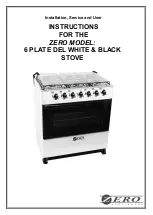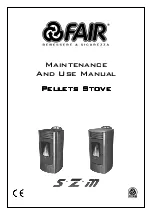
3. Check the seals before connecting a new gas container to the appliance.
Do not use the
appliance if it has damaged or worn seals.
4. The threads on both the gas cartridge and the regulator
must be intact if they are damaged in
any way or awry, replace the gas cartridge; or if the regulator is damaged, DO NOT USE the stove.
Order a new hose and regulator - see Accessories on the side flap.
5. Inspect the hose (so that it is neither kinked nor squashed. Avoid twisting the flexible hose). Lift the
pan support
and drip tray
to ensure that the hose and connector are properly adjusted.
Maximum hose length to be used: 2000 mm.
6. Check that the cartridge is empty before changing it (shake to hear the noise made by the liquid).
PREPARE THE STOVE.
important:
Take
care to ensure that the stove is standing on a stable, flat surface with
no combustible material nearby. Check its stability! If you tip the stove
while there are pots on it, you risk being scalded by hot liquids.
1. Stand the stove on its side with the handle
uppermost. Remove the regulator
and hose
from the slot on the underside.
2. Place the stove on a flat surface.
3. Open the lid on the stove by angling the handle 90°
. It is important that the handle is pointing
straight up, otherwise the lid cannot be opened. Lift the lid as far as it will go.
4. In transportation mode, the pan support
is upside down. Turn the pan support so that the rough
sides are uppermost, towards the pot. Ensure that the metal pins on the edges sit in the holes in the
drip tray
.
5. Attach the gas cartridge to the regulator by screwing with a definite continuous motion as far as it
will go. Do this manually - DO NOT USE a pair of pliers, or similar.
6. Make sure that the gas cartridge is level with the regulator upwards
. Check that no gas is leak-
ing from the connection between the regulator and the gas cartridge. Use soapy water as discussed
in the section “Before ignition” if you are unsure.
LIGHTING THE STOVE.
importanT:
UNDER
NO CIRCUMSTANCES MOVE the stove when it is lit, either with or
without pots. If, due to the wind, the flames are forced down under the
burner, turn the stove off and move it to a more sheltered location.
1. Rotate the gas supply knob
about one turn anti-clockwise, and light the burner with a long
match, pocket lighter or similar. To reduce the gas flow, turn the gas control knob clockwise towards
the round symbol.
2. Once the gas has been lit, you can adjust the flame and the supply of heat with the supply knob.
The gas should burn directly upwards with a steady flame.
3. Put the pot or frying pan on the stove after the gas has been lit.
4. Flaring may occur during the warm up period the first minute of use, or if the appliance is moved
during use
EN







































